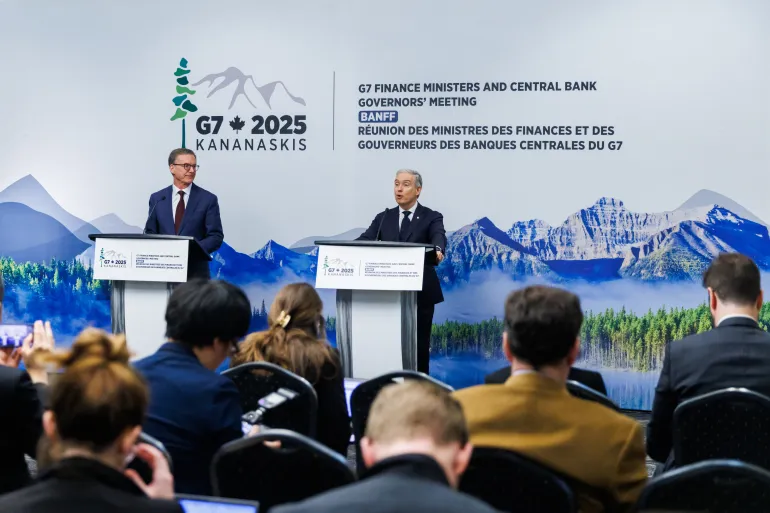Finance ministers and central bank governors from the Group of Seven democracies papered over their differences on Thursday, pledging to tackle excessive imbalances in the global economy and saying they could increase sanctions on Russia.
There had been doubt before the meeting whether it would issue a final communique, in light of divisions over U.S. tariffs and Washington’s reluctance to refer to Russia’s war on Ukraine as illegal. But after three days of talks, participants signed on to a lengthy document devoid of previous language on fighting climate change and which also softened references to the Ukraine war.
“We found common ground on the most pressing global issues that we face,” Canadian Finance Minister Francois-Philippe Champagne told the closing press conference. “I think it sends a very clear signal to the world … that the G7 is united in purpose and in action.”
The officials, who met in the Canadian Rocky Mountains, called for a common understanding of how “non-market policies and practices” undermine international economic security. The document did not name China, but references by the United States and other G7 economies to non-market policies and practices are often targeted at its state subsidies and export-driven economic model.
The G7 statement omitted mention of U.S. President Donald Trump’s tariffs that are disrupting global trade and supply chains and swelling economic uncertainty. Champagne downplayed the lack of communique language on tariffs, but said ministers were not skating around the issue and had discussed its impact.
Canada seeks a deal to eliminate Trump’s tariffs of 25% on many goods, such as steel and aluminum. “We’re trying to enhance growth and stability,” he added. “And obviously tariffs are something in that context that you can’t avoid discussing.”
The gathering sets the stage for a summit of G7 leaders from June 15 to 17 in the nearby mountain resort area of Kananaskis. Trump will attend the summit, the White House confirmed on Thursday.
The G7 communique called for an analysis of market concentration and international supply chain resilience. “We agree on the importance of a level playing field and taking a broadly coordinated approach to address the harm caused by those who do not abide by the same rules and lack transparency,” the grouping said.
It also recognized an increase in low-value international de minimis package shipments that can overwhelm customs and tax collection systems and be used for smuggling drugs and other illicit goods.
The duty-free exemption for packages of value less than $800 has been exploited by Chinese e-commerce companies, such as Shein and Temu. The Chinese embassy in Ottawa said it could not immediately comment on the G7 statement.
The G7 finance chiefs condemned what they called Russia’s continued brutal war against Ukraine and said if ceasefire efforts failed, they would explore all possible options, including further ramping up sanctions.
The description of the Ukraine war was watered down from October’s G7 statement, before Trump’s re-election, calling it an “illegal, unjustifiable, and unprovoked war of aggression against Ukraine.” Trump has diminished U.S. support for Ukraine and suggested that Kyiv was to blame for the conflict as he tries to coax Russia into peace talks.
But the G7 ministers pledged to work together to ensure no countries that financed the Russian war would be eligible to benefit from the reconstruction of Ukraine. “That’s a very big statement,” said Champagne, calling it a fundamental pillar of the communique.
It did not name China or other countries the West has accused of supplying critical components to Russia in defiance of sanctions. Russia’s sovereign assets in G7 jurisdictions would remain immobilized until Moscow ended the war and paid for the damage it has caused to Ukraine, the communique said.
European Commission Executive Vice President Valdis Dombrovskis said the G7 ministers discussed a proposal to lower the G7-led price cap of $60 a barrel on Russian oil exports, since Russian crude is now selling below that. But the plan was not mentioned in the communique, partly because the U.S. Treasury Secretary Scott Bessent was not convinced it was needed, a European official said.
Brent crude currently trades around $64 per barrel. A European official said the United States is “not convinced” about lowering the Russian oil price cap.
Bessent came to Banff to the relief of many participants after he skipped a G20 finance meeting in February in the South African city of Cape Town. G7 officials described his interactions as “constructive” and “flexible” and said some initial stiffness gave way to jokes over dinner.
“We had a feeling that it was a discussion between friends and allies,” a French official said. But Bessent took an unusually low profile for a U.S. Treasury secretary at the G7 meeting, holding no news conference and largely operating out of sight of the press.
Read also: G7 Ministers Convene near Rome for Middle East, Ukraine Issues



